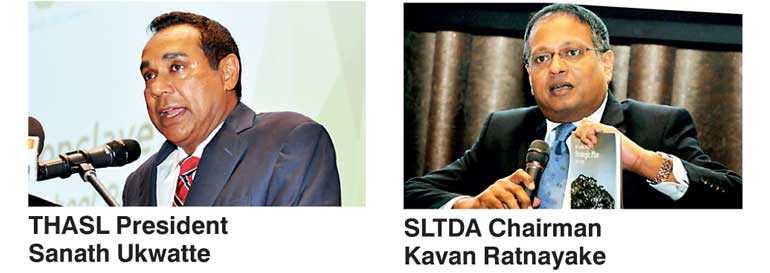Sunday Feb 22, 2026
Sunday Feb 22, 2026
Tuesday, 19 June 2018 00:01 - - {{hitsCtrl.values.hits}}

By Charumini de Silva
As professional bodies call on the Government to limit worker migration, the tourism industry’s regulator yesterday warned it is facing increasing pressure to issue additional work visas for hospitality experts to work at international hotel chains and called for more professionals to be trained.
After signing the Sri Lanka-Singapore Free Trade Agreement (FTA) and commencing negotiations with India on an Economic Technology Cooperation Agreement (ETCA), the Government has come under increasing pressure to limit work opportunities to foreign professionals. However, the Sri Lanka Tourism Development Authority (SLTDA) pointed out that many international hotel chains operating in Sri Lanka have requested for visas to bring down experts to the hospitality industry citing talent shortages in the sector.
“One of the key challenges is that investors are seeking visas to bring down foreign experts to the industry as local talent in the hospitality sector is insufficient,” SLTDA Chairman Kavan Ratnayake stated at panel discussion held at the Hospitality Conclave, organised by The Hotels Association of Sri Lanka (THASL) in Colombo.
Pix by Lasantha Kumara
He said although the authority is granting visas, it was on the condition that they would train local talent simultaneously to take over the position over time.
“We need investors. They can make profits investing in the country, but the Government’s aim is to create employment for the youth. We grant visas, but with a condition that after a year and a half they need to train a local for that position so that they can go back,” he added.
Ratnayake also said the strategy of Sri Lanka Tourism in going forward was to offer an authentic experience to high-end visitors coming to the destination from all over the world.
“We cannot handle mass tourism like Thailand with 30 million visitors. Considering our resources, attractions and services, we should focus on authentic tourism. We are now getting ready for that,” he said.
Noting that Sri Lanka already has a few hotels with around 40 rooms that can charge $ 1,000 per night, Ratnayake expressed confidence that there is potential to attract high spending tourists to the country.
THASL President Sanath Ukwatte also shared insights on seamless career offers to youth with quality hotels opening and operating all over the country in the growing tourism and hotel industries. He called on principals and other education professionals to encourage students to take up tourism as a career.
Noting that the tourism industry has made a substantial contribution to the country in terms of foreign exchange earnings and creating employment opportunities, he said the earnings from tourism grew by over 900% from $ 350 million in 2009 to $ 3.5 billion in 2017, while tourist arrivals increased from a mere 500,000 tourists to 2.2 million arrivals last year.
“Tourism is now the second highest net foreign exchange earner in the country. Unlike in other foreign exchange earning industries, 90% of the income remains in the country. Our target is to become the top net foreign exchange earner in Sri Lanka by 2020. Our vision is to be recognised as the world’s finest island for memorable and diverse experiences, and our mission is to be a high value destination, offering extraordinary experiences that reflect Sri Lanka’s nature and cultural heritage,” Ukwatte emphasised.
Acknowledging that Sri Lanka has focused on its traditional markets, such as the UK, Germany, France, Russia and India, Ukwatte said a range of new markets, such as China, the Middle East, Australia and the US, have started to visit the country as a holiday destination.
“We are high in demand,” he added
The THASL President also said that in 2017, the total employment contribution from travel and tourism for employment in the country, direct and indirect, was 11% with total employment at 875,000 jobs. In terms of supply (inventory) growth, he said the industry is forecasting another 6,500 rooms to come in to operation by 2020, and 100,000 direct job opportunities will be created.
“This will result in a substantial number of indirect jobs in the near future. As you are aware, farmers, vegetable suppliers, fishmongers, carpenters, entertainers, taxi drivers, handicraftsmen and all others in the supply chain will benefit from the tourism industry. This is one of the unique features of this industry as it trickles down to all layers of the economy,” he stressed.